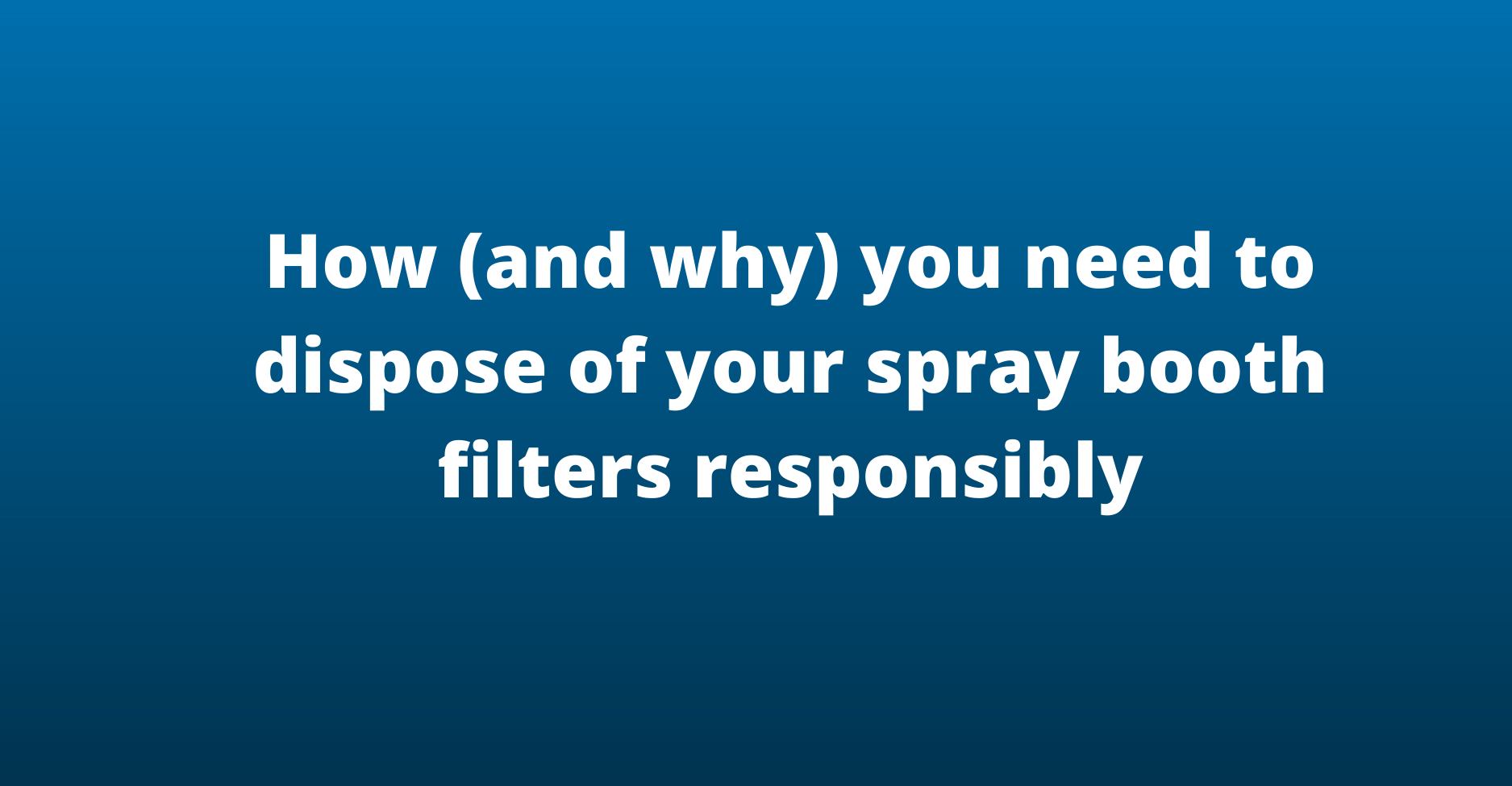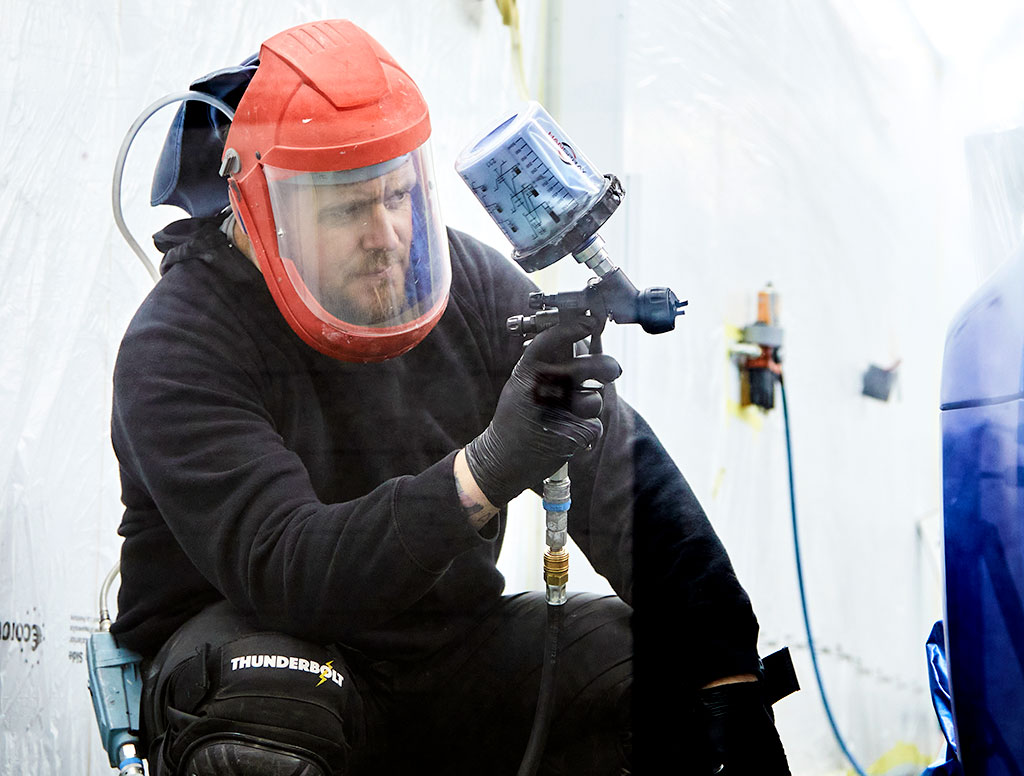Between legislative testing and adherence to the Health and Safety Executive (HSE), our business and those belonging to our industry are subject to any number of safety obligations. One of the foremost obligations is that of spray booth filter disposal.
Paint spraybooth regulations in the UK maintain that your extract filters need to be disposed of safely and responsibly because of the potential hazards to the environment. Utmost spraybooth safety needs to be upheld, which is why we have written this guide for you.
Why do spray booth extract filters need to be removed ‘responsibly’?
Because most paint products contain hazardous compounds with the potential to be flammable, you need to take extra precautions when disposing of them. They cannot be recycled, and so if they are discarded they pose a danger to the environment as well as anyone in the proximity.
The potential environmental impact of extract filters is significant in that if vendors across the country did not adhere to spray booth regulations in the UK, it could pose a huge threat by the majority.
To ensure that you’re following the correct paint booth filter disposal regulations, follow these steps.
How to dispose of filters according to spraybooth safety guidelines
1. Test your filters
The first thing you need to do is ensure whether or not the filters you’re disposing of actually contain hazardous compounds. To do this, carry out a Toxicity Characteristic Leaching Procedure (TCLP) laboratory test. The test will determine whether your filters have been exposed to harmful compounds or contaminants.
These harmful compounds or contaminants include the following:
– Arsenic
– Barium
– Cadmium
– Chromium
– Lead
– Mercury
– Selenium
– Silver
If your TCLP test shows no trace of the above and they have not been exposed to the above, then you are free to dispose of your filters as part of your general waste. Note that you should make it known that the filters are non-hazardous by either contacting your waste management company or as is more often the case affixing a ‘non-hazardous’ sign to the filters. One last thing: keep hold of the test results just in case your safe rubbish is challenged by your council.
2. Responsibly dispose of hazardous filters
If your test shows a definite trace of those hazardous compounds, you must not include them with your general waste. Instead, you need to store them safely until you can send them to a qualified waste disposal company. You will need to store them in a non-leaking container marked ‘hazardous waste’ along with a brief description of the contents.
An important thing to note is that you should always leave the filters to fully dry before sending them away. Once they’re properly dried, the chance that they will ignite is drastically reduced.
3. Take steps to prevent your filters from being ‘F-listed hazardous waste’
This step relates to your spray gun cleaning. If your filters are exposed to the solvents in your spray gun (which when cleaning may find its way onto your filters) then you run the risk of your filters being further contaminated. Depending on the solvents you use in your spray guns, your filters can become contaminated by compounds like methyl ethyl ketone which, like the others in our list, are hazardous to the environment.
We’re here to help
At AGM Services, our spray booth service and maintenance checks are designed to improve the performance of your spray booth. Our engineers can carry out a range of equipment checks to improve the productivity, reliability and energy-efficient performance of your paint booth.
A vital part of an AGM service contract is the guidance around these kinds of matters. We not only help with legislative testing, but we also provide quick emergency breakdown cover so that your business can be up and running in no time.
If you would like to discuss further, simply call 01706 363 585, email sales@agm-services.co.uk or fill in our quick enquiry form here.
Here are some more spray booth resources you might like:
- How to prevent dust, dirt and debris in your spray booth
- Spray booth regulations and how you can adhere to them
- Why do we carry out breathing air quality tests?
- DIY spray booth maintenance checklist
Spray booth filter disposal FAQs
How should spray booth filters be disposed of?
Paint booth extract filters that are declared toxic should not be discarded with regular trash. They must instead be properly kept and transported to a hazardous waste disposal site. Keep them in a leak-proof container labelled “hazardous waste” with a description of the contents, such as “waste paint booth filters.” The container should then be transported to a hazardous waste disposal site by a qualified hazardous waste transporter.
Are spray booth filters hazardous waste?
Because they are ignitable, your paint booth filters will be classified as hazardous waste if they contain any wet flammable materials.
How long do spray booth filters last?
You can follow the manufacturer’s recommended changing recommendations once you’ve determined which filter to use with your booth, but this isn’t enough. Any filter’s lifespan will vary depending on circumstances unique to your workspace. If you use a lot of paint, for example, your filters will last a lot less time than they should. The goal is to incorporate routine checks into your daily operations.



